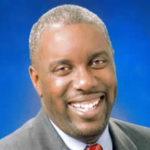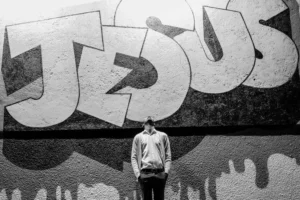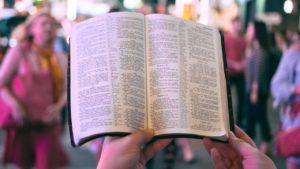All I really knew of church growing up was that whenever my brothers found themselves in trouble they “cleaned up” and “got their acts together” by going to church. They attended until their problems died down and then gradually returned to their previous pursuits. That was church. The place you attended when your troubles overtook you.
So, it was to church that I needed to go when I was arrested the summer following my sophomore year in high school. All the illusions of success in small town North Carolina were quickly dashed as rumors spread, behaviors changed, friendships ended, and the world shrank even more. I was in trouble for the first time in my life and I needed to “clean up.” So, I began attending church.
About three Sundays into my effort to get things back on track, I decided I needed to be more committed than my brothers. So, I decided not just to attend, but to join the church. One Sunday following the sermon I left my seat in response to an altar call and journeyed up to the big oak pulpit with the larger-than-life Bible and scarlet bookmark draping over it.
I could hear the approving murmurs of some older ladies as I went up front, though I didn’t know why they should be pleased at my coming up front. A deacon, a friend of my mother’s, met me at the pulpit and ushered me into a back room. “Have you ever been baptized?” he asked. “No,” I said, wondering if that was part of the deal. He assured me it was and noted some things on a small index card. We went back out front where he announced that I was applying for membership “as a candidate for baptism.” Whatever, I thought, just as long as this thing sticks.
About two weeks later the pastor dunked me in the baptismal pool, though I was not at all baptized in a biblical sense. In all of that time, I never heard the gospel. I was never asked if I understood what it meant to follow Jesus as Lord and Savior, if I was repentant and trusting in Christ alone for rescue from the wrath of God. I can’t even say that I knew God had any wrath against sin. I was the same person I was when arrested a month or so earlier. In fact, when I dried off from the immersion, I rushed out of the service around the corner to the pool hall where I spent all of my time gambling and drinking. I attended church for some six months or so after that, but I gradually concluded that Christianity wasn’t real. It had no power to change and Jesus, while probably real and well-intentioned, had little He could do for me.
For most of my junior and senior years, I skulked through the halls swinging in mood from anger to depression to indifference. Not many people noticed. My grades remained high. I continued on the basketball team. And I made the social rounds at football games and after-parties. One teacher who noticed, an eccentric middle-aged Jewish lady transplanted by marriage from some northern state, as a fellow alien perhaps, tried to befriend me and give me something positive to do with my anger. She introduced me to the writings of a number of 1960s radicals — Amiri Baraka, Stokely Carmichael, Gwendolyn Brooks, Malcolm X and others. It was a well-intended effort, but giving an angry kid the incendiary writings of angry adults is a little like giving a pyromaniac free gasoline and a box of matches.
I grew angrier — silently angry at a father who had left a few years earlier, angry at friends who distanced themselves from me because of my arrest, angry at Christians and the church, and angry at people in general. I stayed this way until I went off to college.
Mecca
My college roommate was my best friend from high school. He and I arrived at college with barely any supplies for school, two cases of beer, and ready for the college party life. My best semester in college was my first semester, which was a minor miracle since most of the time I was drinking.
But by the second semester of my freshman year, dissatisfaction was taking root in my heart. Life was empty. The routine was too routine, and I yearned for more though I didn’t know what.
I continued to read everything I could find about African and African-American history and culture. I devoured the stuff, angry that my high school education so dismissively skipped over this part of my identity and history. Marcus Garvey, Malcolm X, and Martin R. Delaney became heroes. I wanted very much to be a Garvey or Malcolm to my own generation.
One day, several striking men appeared at a campus lecture. They were clean shaven, well-dressed, upright. They spoke of the African-American community and the need for Black men to be men — to clean up, to lead and care for their families, and to live devout spiritual lives.
I was enthralled. I’d never seen Black men like these — confident, focused and somehow able to channel their anger into a cause. I discovered that these men were Muslims, members of the Nation of Islam which I had read so much about as I studied Malcolm X and the history of the Civil Rights movement. I wanted to be like them; I wanted to be manly.
I ended up befriending a couple of these men, learning from them what I could. To their disappointment, I learned enough to know that the Nation of Islam was a cult and not true Islam. For the rest of my freshman year I continued learning as much as I could about true Islam from reading and from friends.
In my sophomore year in college I converted to Islam. A classmate had returned from summer vacation dressed in traditional Muslim garb. He had converted to a more orthodox brand of Islam while spending some time with an uncle in New Jersey. He asked us to call him Fahim and he disavowed the rowdy life we had all lived during our freshman year. Studying with Fahim gave me enough understanding and courage to convert to Islam. For me Islam was the answer to the discipline, the brotherhood, and the longing for adult male leadership that I wanted since age 14. Its promise of a simply-understood God, of a philosophy and discipline that provided for all of life’s needs, of a universal religion for all men made sense to me.
I was zealous for Islam. I spoke of it whenever and wherever I could. I introduced several fellow students to the teachings of the Qur’an and helped them to enter the faith as well. Five times a day I prayed facing Mecca. I rose early to study the Qur’an and other Islamic literature. I fasted during Ramadan. I served the community. I lived a devout and faithful Muslim life to the best of my ability. Life was ordered, purposeful … and fueled by a growing anger, this time at Whites, overly patriotic (that is, patriotic at all) Americans, and Christians who hid the truth of Allah.
I opposed the cross of Jesus Christ with all my might. I regarded the crucifixion as a big myth, a hoax, a lie perpetrated against weaker-minded, less-informed, sentimental people. Whenever Christian students passed out tracts or street preachers came near campus, I heckled and harassed them. I desired to overthrow the faith of anyone calling themselves “Christians.” I had found the truth in Islam and purposed that everyone else should discover it as well.
Babylon … again
This was my life for the remainder of undergraduate school and a year or so after graduation. But gradually, almost imperceptibly at first, I noticed that I was growing more and more hollow. Cold really. The zeal once fueled by anger began to wane. Once I adjusted to all the rituals and outward observances of Islam, I then grew more aware of my interior life.
Awareness of the emptiness of my own heart grew crystal clear for me after a water cooler conversation with some co-workers.
We were engrossed in a conversation about people we admired and respected. Folks were listing the usual suspects: mothers, fathers, great leaders and so on. But surprisingly, one of my co-workers said, with all seriousness, “I can’t think of a more righteous person than Thabiti.” I tried to pooh-pooh her statement with some light, dismissive response of my own. But she countered, “I’m dead serious. Of all the men I know, you are easily the most righteous. You don’t curse. You don’t drink. You treat your wife so well.” And on she went.
While she was correct in her observations — I didn’t curse or drink any more, and I tried to treat my wife Kristie well — her conclusion was extremely flawed. What she observed was outward behavior; what she couldn’t see was my heart. But I could, and the thing was as brittle, dry and empty as it could be. The label “righteous” fell into all of that deep emptiness, rattling occasionally as it plummeted and banged against the hull of my heart. One thing I knew: I was not righteous, not in any essential sense.
Around the time of that conversation, I was also becoming aware that I could not be righteous. I made prayer faithfully — even developed a dark patch on my forehead from bowing onto my prayer carpet. I read the Qur’an actively. I did all I could, but no righteousness, no essential change. My anger, my lusts, my hatred, and evil thoughts were all still with me.
And as I read the Qur’an, studying it for solutions, all I found were contradictions and half truths. The Qur’an taught that Jesus was virgin born (Surah 3:45-48, 19:20ff) and that he was helped by the Holy Spirit (Surah 2:87, 253). The Qur’an and the Hadith taught that Jesus was faultless. And some 11 times the Qur’an referred to Jesus as “the Messiah.” How could Jesus be virgin born, helped by the Holy Spirit, faultless, the Messiah and not be the Son of God, a member of the Trinity, and the Savior that the Old Testament prophets looked for? Every Muslim believes that Jesus is a prophet, and that a prophet speaks the very words of God, and that the Torah, Gospels and Psalms of David were revelations from Allah. How could I consistently hold that view and reject Jesus’ teachings about himself and the way to eternal life?
I couldn’t. But rather than bend the knee in worship to Jesus, I threw up my hands and renounced all religion. On my best days, I was an agnostic; on my worst days, I toyed with atheism. I was empty, confused, arrogant, and lost.
False Hope
I lived a lost, God-rejecting, self-seeking life for about a year. Not surprisingly, my marriage to Kristie was growing empty as well and the difficulties were starting to appear overwhelming.
Then, we learned that my wife was pregnant with our first child. Our families were ecstatic. We began to feel a sense of hope and anticipation, daydreaming about a white house with picket fence and the gentle coos of a new child. We began to build our lives on this dream.
Three months into the pregnancy, we visited the doctor’s office for a regular visit. It was to be the first visit where we heard the baby’s heart beat. We were thrilled beyond measure.
We entered the examination room, where Kristie promptly readied herself for the exam. The doctor entered, mostly ignoring me, and began her work. After a few minutes, making several different attempts to find the baby’s heart beat, the doctor spoke in the iciest human voice I’ve ever heard. “I’m sorry. There’s no heartbeat.”
I stood frozen. My wife sobbed and wept uncontrollably. Unable to comfort her or to reverse that terrible pronouncement, I just stood there. My brittle heart cracked, and in flooded a message I did not expect or understand, “Son, come home.”
Coming Home to Calvary
For weeks, that message rang in my head, “Son, come home.” On several occasions I passed and took particular note of a car with “John 1:12” printed on the license plate. I recognized it was from the Bible, but I didn’t know the verse. Kristie and I simply tried to keep moving with life. She returned to teaching after a week or so, but I mostly sat around the house depressed.
One Tuesday morning, two hours late for work but casually flipping through television channels, I landed on the broadcast of a weekly church service. I couldn’t explain why I stopped to listen, but I did. The words had life. They beckoned me.
It wasn’t even a particularly evangelistic sermon. The preacher simply expounded on Paul’s words to Timothy: “Study to show yourself approved.” But those words gripped me.
I began to tape the show and to watch it regularly with Kristie. We learned that the pastor’s church was in the Washington, D.C. area, where Kristie’s sister lived. We decided to visit her sister and the church.
We were among the first to enter the church that Sunday morning. We sat right in front of the pulpit about five rows back. It seemed that half of the church’s 22,000 members packed out this first service. But God intended every word spoken that morning from Exodus 32 for me. Every sin, every act of idolatry, every wicked attitude mentioned that morning described me. The preacher expounded the Law, and I saw my need for a Savior, someone to rescue me from the wrath of God against sin.
And then the preacher held out Jesus. He made it clear that Jesus was the Son of God sent by the Father to die as a substitute for all who would turn from their sins, renouncing them, and turn toward God through faith in Jesus.
For the first time, I longed to know God. I longed to know Jesus. I longed to be saved from the misery of sin and the life controlled by it.
In God’s kindness and grace, both my wife and I came to saving faith on that Sunday morning nearly 12 years ago. We saw Calvary’s rugged cross and we clung to it for our lives, rejoicing in the risen Savior who gives eternal life to all who believe on Him.
Twelve years later, I am a pastor preaching this glorious Gospel of eternal life and salvation through Jesus Christ. The cross which I once despised has become my only hope and message by God’s grace. Though the darkness and idolatry of Islam once dominated me, I’ve found freedom and forgiveness in the cross of Calvary.
Copyright 2006 Thabiti M. Anyabwile. All rights reserved.











